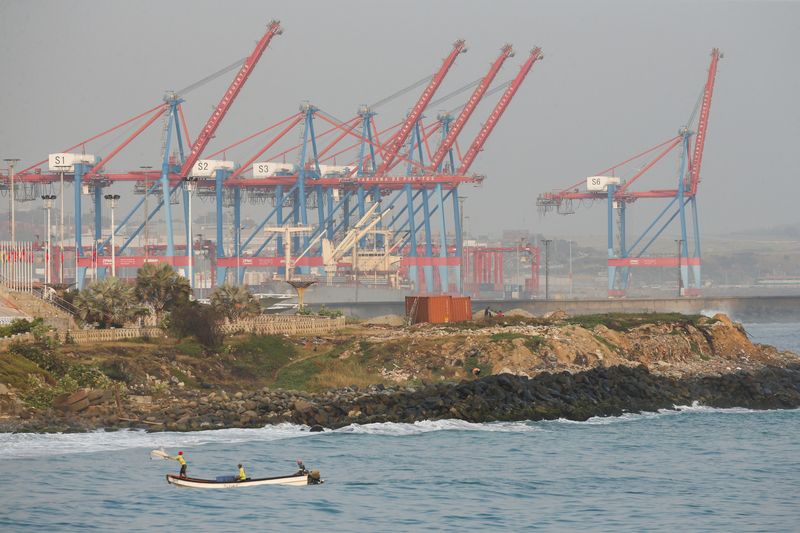By Marianna Parraga and Deisy Buitrago
HOUSTON/CARACAS (Reuters) -The day after the United States announced it would reimpose costly limits on Venezuela's oil sector, the South American nation braced for the consequences and its president warned that the "grave error" would also hit U.S. interests.
Announced by U.S. officials on Wednesday, Venezuela's loss of a key U.S. license that allowed it to freely export and increase investment in its oil sector will hit the volume and quality of its crude and fuel sales while prompting a flurry of requests for individual U.S. deal authorizations.
Washington had warned it would not renew so-called license 44 absent progress by President Nicolas Maduro toward implementing an electoral roadmap agreed with opposition leaders last year that sought to ensure free and fair elections this year.
Speaking at the Caracas headquarters of state oil company PDVSA, Maduro criticized the administration of U.S. President Joe Biden for making good on its "blackmail threat" in an address broadcast on state television.
"While trying to harm us President Biden, you are doing double damage to yourselves because Venezuela will stick with its own path," he said, flanked by PDVSA workers.
Last October the license eased oil sanctions that had been in place over the previous five years on OPEC-member Venezuela, once Latin America's top oil producer.
On Wednesday, U.S. officials gave companies 45 days to wind down pending transactions under a more restrictive license called 44A.
The period could allow departures by some oil supertankers chartered by PDVSA customers that have waited for months to load in Venezuela, but others might need individual U.S. authorizations to complete their purchases.
Venezuelan officials argue the sanctions had little effect at home, but would damage attempts to normalize bilateral relations and hit U.S. interests in the Venezuelan oil industry.
Washington said on Wednesday it would process specific authorization requests for doing business with Venezuela, a commitment Venezuelan officials said they expect the U.S. to honor.
Authorizations previously granted to oil firms including Chevron (NYSE:CVX), Repsol (OTC:REPYY) and Eni were not withdrawn, which secures Venezuela's oil flows to the United States and Europe.
On Thursday, Maha Energy said it had requested a special license from U.S. authorities earlier this year to operate PetroUrdaneta in western Venezuela.
The U.S. Department of the Treasury, however, cautioned that entering into new business arrangements or investments previously authorized "will not be considered wind-down activity," casting doubts on what type of transactions will be allowed.
RACE AGAINST TIME
Venezuela's economy is suffering a long-running crisis, though the government has made strides on inflation control in the last year, bringing usually triple-digit 12-month figures down to about 68% in March.
The country's prior, six-month license did not provide enough time for Venezuela to secure long-term energy investments, but companies already in the country were negotiating expansions and projects linked to existing joint ventures with PDVSA.
Venezuela expects some of those expansions to be authorized in the 45-day window, including with Chevron and Repsol, and it will resort to individual license requests after that, Oil Minister Pedro Tellechea said on Wednesday.
On the geopolitical front, the withdrawal of the most significant element of U.S. sanctions relief marks a major step back from Biden's policy of re-engagement with Maduro.
Venezuela's opposition continues to negotiate the selection of a candidate for the July presidential election, after both the winner of its primary and her alternate were prevented from registering.
License 44 had allowed PDVSA to expand exports to pre-pandemic levels, improve cash flow and secure imports of diluents and fuel for the domestic market.
Analysts expect that its expiration will cause oil exports to stagnate this year at around 900,000 barrels per day (bpd) while oil output would reach a ceiling of about 1 million bpd in 2025.
Under a separate U.S. authorization still in effect, about one-fifth of Venezuela's oil exports sent by Chevron to the U.S. should continue flowing and rise to 200,000 bpd by year end. About 80,000 bpd in crude shipments to Europe also are not expected to decline.
In March, PDVSA's oil exports climbed to the highest level in four years, at some 874,000 bpd, as customers rushed to complete purchases ahead of the license expiration. But the backlog of tankers waiting to load at Venezuelan ports has not eased significantly, shipping data showed.

The six weeks granted by the U.S. to complete transactions might not be enough to resolve the bottleneck entirely, traders said.
Without the authorization, PDVSA is expected to resort again to little-known intermediaries to sell its oil under price discounts, mainly to Asia, unless enough U.S. individual authorizations are issued, experts said.